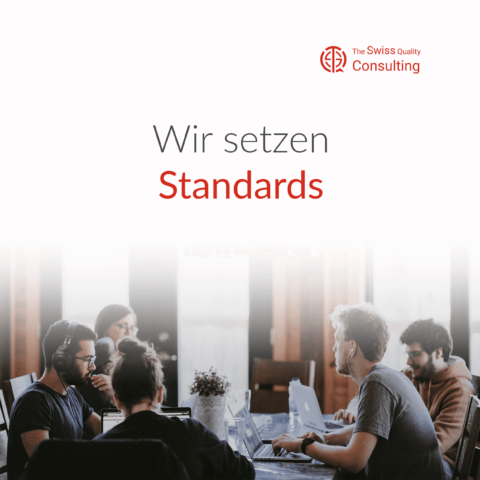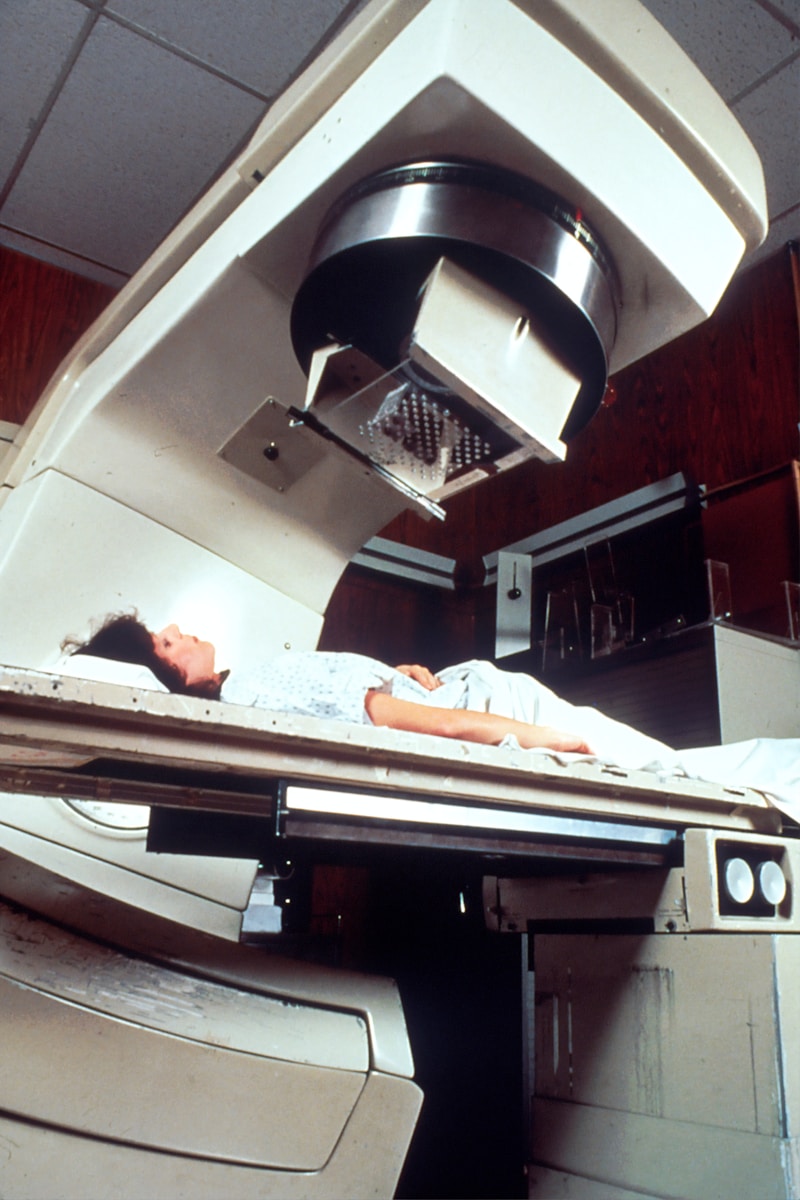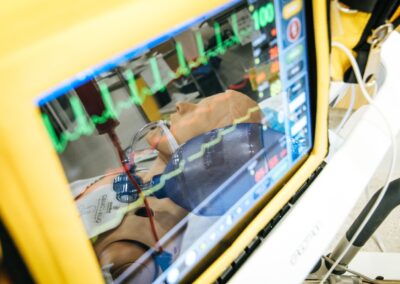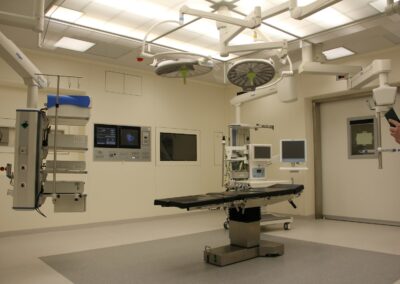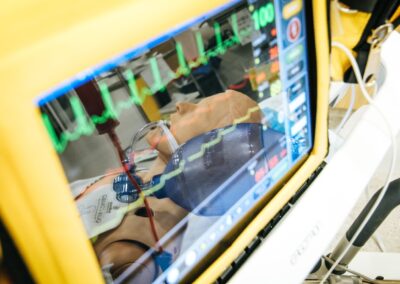The Potential of AI in Transforming Healthcare for Improved Diagnostic Accuracy and Personalized Treatment
The Role of AI in Diagnostic Accuracy
The integration of AI in healthcare offers potential for enhanced diagnostic accuracy and personalized treatment plans, improving patient outcomes. Advanced AI algorithms are capable of analyzing vast amounts of medical data with unprecedented speed and precision, leading to more accurate diagnoses. In regions like Saudi Arabia and the UAE, where healthcare systems are rapidly modernizing, the adoption of AI technologies is revolutionizing medical practices.
AI-driven diagnostic tools leverage machine learning and deep learning techniques to identify patterns in medical images, lab results, and patient histories that might be missed by human clinicians. For instance, AI algorithms can detect early signs of diseases such as cancer, cardiovascular conditions, and neurological disorders with high accuracy. This early detection is crucial for prompt intervention and effective treatment, ultimately improving patient survival rates and quality of life.
Business executives and healthcare leaders in Riyadh, Dubai, and other key cities must recognize the transformative potential of AI in diagnostics. Investing in AI technologies and fostering partnerships with AI developers can drive significant advancements in healthcare delivery. Additionally, executive coaching services can help leaders navigate the complexities of AI integration, ensuring that they make informed decisions that benefit both patients and healthcare providers.
Personalized Treatment Plans through AI
AI’s ability to process and analyze large datasets enables the creation of highly personalized treatment plans tailored to individual patients’ needs. By considering a patient’s genetic makeup, lifestyle, medical history, and other relevant factors, AI can recommend the most effective treatments with minimal side effects. This personalized approach not only enhances treatment efficacy but also reduces the trial-and-error aspect of traditional medical practices.
In the context of Saudi Arabia’s Vision 2030 and the UAE’s Centennial 2071, which emphasize innovation and excellence in healthcare, personalized treatment plans powered by AI align perfectly with these national goals. By leveraging AI, healthcare providers can offer more precise and effective treatments, leading to better patient outcomes and overall public health improvements.
Entrepreneurs and mid-level managers in the healthcare sector should explore opportunities to integrate AI-driven personalized treatment solutions into their services. This involves staying updated on the latest AI research, collaborating with AI experts, and investing in training programs for healthcare professionals. By doing so, they can ensure their organizations are at the forefront of medical innovation, delivering superior care to patients.
Improving Patient Outcomes with AI
The ultimate goal of integrating AI in healthcare is to improve patient outcomes. AI technologies can significantly enhance the quality of care by enabling more accurate diagnoses, personalized treatments, and proactive health management. For example, AI can predict potential health issues before they become critical, allowing for timely preventive measures. This proactive approach is particularly valuable in managing chronic diseases, where early intervention can prevent complications and improve long-term health.
In Riyadh and Dubai, where healthcare systems are continuously evolving, the implementation of AI can lead to substantial improvements in patient outcomes. AI-powered tools can assist healthcare providers in monitoring patients’ health remotely, identifying early signs of deterioration, and adjusting treatment plans accordingly. This continuous monitoring and timely intervention can reduce hospital readmissions and improve patients’ quality of life.
Moreover, AI’s role in enhancing healthcare extends beyond patient care to include operational efficiencies. AI can streamline administrative tasks, optimize resource allocation, and improve overall hospital management. By reducing administrative burdens, healthcare providers can focus more on patient care, further enhancing patient outcomes.
Strategic Considerations for AI Integration in Healthcare
Ethical and Regulatory Considerations
As AI becomes more integrated into healthcare, ethical and regulatory considerations must be addressed to ensure responsible use. AI systems must be transparent, explainable, and unbiased. Ensuring that AI algorithms do not reinforce existing biases or discriminate against certain groups is crucial for maintaining equity in healthcare. Regulatory frameworks need to be established to govern the use of AI in healthcare, protecting patient privacy and data security.
In Saudi Arabia and the UAE, where healthcare systems are rapidly advancing, developing robust ethical and regulatory guidelines for AI integration is essential. Collaboration between governments, healthcare providers, and AI developers is necessary to create standards that ensure AI technologies are used responsibly and ethically. This collaborative approach will build public trust in AI-driven healthcare solutions, fostering their widespread adoption.
Training and Education for Healthcare Professionals
The successful integration of AI in healthcare requires comprehensive training and education for healthcare professionals. Medical practitioners need to understand how AI technologies work, how to interpret AI-generated insights, and how to integrate these insights into clinical decision-making. Continuous education and training programs are vital for ensuring that healthcare professionals stay updated on the latest AI advancements and best practices.
Executive coaching services can play a significant role in this educational process, providing healthcare leaders with the skills and knowledge needed to navigate the complexities of AI integration. By fostering a culture of continuous learning and innovation, healthcare organizations can maximize the benefits of AI technologies and improve patient outcomes.
Collaboration and Innovation in AI Research
Collaboration and innovation are key to advancing AI research in healthcare. Governments, academic institutions, healthcare providers, and technology companies must work together to develop and refine AI algorithms that address real-world healthcare challenges. This collaborative approach will drive innovation, leading to the creation of more effective and reliable AI-driven healthcare solutions.
In Riyadh and Dubai, where innovation hubs are emerging, fostering collaboration between various stakeholders can accelerate the development and adoption of AI in healthcare. Joint research initiatives, funding programs, and innovation accelerators can support the creation of cutting-edge AI technologies that improve diagnostic accuracy, personalize treatments, and enhance patient outcomes.
Conclusion
The integration of AI in healthcare offers immense potential for enhancing diagnostic accuracy, personalizing treatment plans, and improving patient outcomes. For business executives, mid-level managers, and entrepreneurs in Saudi Arabia, the UAE, and beyond, understanding and embracing AI technologies is crucial. By addressing ethical and regulatory considerations, investing in training and education, and fostering collaboration and innovation, healthcare leaders can harness the power of AI to transform healthcare delivery and achieve better health outcomes for all.
#AIinHealthcare #HealthcareInnovation #PatientOutcomes #BusinessSuccess #LeadershipSkills #ProjectManagement #SaudiArabia #UAE #Riyadh #Dubai #ArtificialIntelligence #GenerativeAI #Blockchain #Metaverse #ExecutiveCoaching






